Memories of days past
more talk about the present
than about the past.
You can often hear from apologists for same-sex relationships that homosexuality was the norm in the ancient world, especially in ancient Rome and Greece. In fact, the myth of a “homosexual utopia” in ancient Greece was popularized by Oscar Wilde, who was convicted of sodomy, and the fragmentary evidence that has reached us in the form of ancient texts and works of art indicates rather the opposite. Throughout human history, homosexuality, especially in a passive role, has existed as a shameful and marginal phenomenon. Only in decayed civilizations, during their decline, same-sex practices may have gained some popularity, but even then, attraction to members of the same sex, stronger than to representatives of the opposite, was considered beyond the norm. Nowhere and never before our time have exclusively homosexual relationships between adults been sanctioned.
While reading this article, it is necessary to keep in mind the conventionality of the modern term "homosexuality" in relation to sexual practices between people of the same sex in antiquity, which are hardly comparable to what is happening in the LGBT community today. The fact is that acts of oral or anal penetration have always been considered deeply humiliating and defiling for the recipient, so there can be no question of any legitimate homosexual couples.
In Athens, homosexuals were despised and obliged to declare their vice in ecclesia, after which they lost all civil rights. If they hid their vice, they were ostracized or executed. For them, there were derogatory nicknames such as euryproktos (wide anus) chaunoproktos (gaping anus) and lakkoproktos (anus like a pit).
In the speech of Aeschines against Timarch it is said that if any Athenian is a man's lover, then he is forbidden:
1) be one of the nine archons,
Xnumx) be a priest,
3) to be an advocate in court,
4) to hold any position inside and outside the Athenian state
5) to act as a herald or to elect a herald,
6) to enter sacred public places, participate in religious liturgies with a wreath on the head and be in that part of the square, which is consecrated by sprinkling.
The violator of the above instructions was punished by death.
The overwhelming majority of researchers agree that in ancient Greece, homosexual contact between two equal men was considered deeply unnatural and severely punished. To designate a man who voluntarily assumed a passive role in anal-genital contact, there was a special concept: κίναιδος - kineidos (fallen). Accepting a passive role, the kineidos became like a prostitute and became unworthy to be a free man. As a result, kineidos was deprived of its citizenship rights. It was also believed that the person who allowed to be anally penetrated was considered prone to abuse alcohol, food, money or power. (Greenberg in roger 1997, p. 181).
A few quotes:
• There is no evidence that homosexuality was universally recognized ... The Greeks never "canonized" the physical act of sodomy ... With a more detailed analysis, the widespread practice of ridicule and aversion to homosexuals becomes apparent. (Karlen 1977, p. 33, 35).
• Of those who indulged in passion, no one was more disgusted than the class of sexual degenerates known as katapugons or kinaidoi (Davidson 1998, p. 167).
• The image of kineidos was absolutely negative ... (Clark 2008, p. 22).
• Kineidos was perceived as a repulsive person, a pervert in both public and sexual terms (King in porter 1994, p. 30).
[ancient Greeks believed that] anal-genital penetration between adult men was unacceptable ... associated with obscenity and rudeness (Keuls 1995, p. 291, 299).
• [ancient Greeks believed that] an adult male who participated in a receptive role in anal-genital penetration lost the status of a man and became effeminate, subject to condemnation and contempt (vanggard 1972, p. 89).
• [The ancient Greeks believed that] a man who likes to be anally penetrated by another man is a pervert, a source of potential social unrest, and he should be treated like a woman whose role he takes (Thorton 1997, p. 105).
• A passive role in anal-genital penetration was considered humiliating and disgusting. They were called euryproktoi - literally "wide anus" (Garrison 2000, p. 161).
• The views in Athens on an adult man who allowed himself to be in a passive role in genital-anal penetration were absolutely negative. Such a person was regarded as a potential spy and enemy of the state, since he had already betrayed his own nature and, therefore, was able to betray the whole society ... ” (Dover 1978, p. 20).
In Rome, passive homosexuality was considered a war crime and a soldier caught in it was beaten with sticks. It was believed that the receptive role makes the Romans "effeminate", and having lost his masculinity, he becomes useless and even harmful to the community in civil and military relations. Plutarch described how the Senate sentenced a certain Capitoline to a large fine for "vile offer" to the son of his colleague, after which the "Skantiniev Law" prohibiting "debauchery with boys and men."
LGBT advocates also refer to Plato's “Feast,” in which he allegedly praises love for boys and young men, but it is a question of love, not sodomy. The concept of “Platonic love”, which describes a sublime spiritual feeling without a low-sensual physical attraction, originates in this work, and what Plato thinks of homosexuality can be read in his “Laws”:
“Nature encourages the female sex to be related to the male sex from birth, and it is clear that pleasure is given according to NATURE, while the connection between the male and male, and female and female is AGAINST NATURE. "No one should make contact with the noble and free, except for their own wife, and they are not even allowed to distribute extramarital seed among concubines or to make contact with men, which is unnatural, and it is better to completely forbid communication between men."
A student of Plato, Aristotle, speaking about bestial and morbid conditions in Book VII of Nicomachean Ethics, along with cannibalism, trichotillomania and parorexia, also mentions homosexuality:
“These are bestial depots (some of them from insanity, such as a person who sacrificed and ate his mother, or a slave who ate a friend’s liver), and, finally, there are [conditions] as if painful or from [evil ] habits, such as the habit of pulling out hair and biting nails, as well as coal and earth. Add to this the love pleasures with men. ”
"Pederasty"
Now let's look at what constituted "sanctioned pederasty" in ancient Greece. One of the first researchers of sexopathology - Kraft-Ebing, instead of having religious connotations of the word "sodomy", began to use the word "pederasty" as a scientific term for the introduction of the penis into the anus.
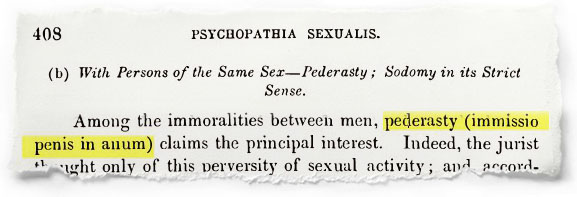
At the same time, in the ancient Greek language, this word literally means "love for children": pedos - a child, in the sense of a youth (from 7 to 15 years old), erastis - loving. It should be noted here that in the Greek language there are four words that are different in meaning - storge (στοργή), philia (φιλία), éros (ἔρως) and agape (ἀγάπη), which are all translated into Russian as “love”. They mean affection, self-sacrifice, responsiveness, friendliness, affection, etc. In modern, impoverished Greek, words with roots “eras” refer to erotic sensuality, but in ancient times έρωτας was used in the sense of ardent friendship. This is exactly what happened between Hercules and the wise centaur Chiron, where the first "overwhelmed by love" went to live with him in a cave. Of course, there is no question of any sodomy here. The same applies to the Spartans, divided into loyal couples who could sleep under the same cloak and kiss each other before battle. It is reliably known that the punishment for sodomy among the Spartans was beating with sticks, shameful exile and even death. According to the ancient Roman writer Claudius Elian in the third book of "Colorful stories":
“Spartan youths keep with those who are in love with them, without pride and arrogance, on the contrary, their treatment is contrary to the usual behavior of young handsome men in such cases - they themselves ask them to be“ inspired ”by the lovers; in translation, this means that you need to love the boys. However, this love does not contain anything shameful. If the boy dares to admit immodesty towards himself, or if the lover dares to her, it is unsafe for both to remain in Sparta: they will be sentenced to exile, and in other cases even to death.
A kiss in that era served as an expression of parental and comradely feelings and didn't have no sexual meaning (Lombroso 1895). According to the ancient historian Xenophon, the relations of a mature warrior with boys and youths were reduced to idealized male friendships, and sexual intercourse was considered a perversion comparable to incest.
In ancient Greece, every young man from the age of 12, with the approval of his father, chose a role model for himself - one of the citizens or several citizens. Here, the matter was not limited to simple imitation, but was based on strong relationships, often more solid than family ones. To be "erastis" was honorable, but it also entailed responsibilities: not to drop oneself in the eyes of the pupil, and even worse - to be accused by citizens of improper upbringing of the pupil. So the mentor could be punished for the misdeeds of his pupil, as well as for exorbitant demands or overwhelming tasks. If it was about the possible corruption of the pupil (including sexual corruption), then the punishment for erastis was death. “Speeches of Aeschines. Against Timarch ", ch.16:
“If any Athenian dishonors, corrupts or defiles a free young man, then the young man’s parent must send a written statement to the prosecutors and demand the punishment of the perpetrator. If the court finds him guilty, then he must be betrayed to the eleven executioners and executed on the same day. “Those who do the same to slaves are considered guilty of the same crimes.”
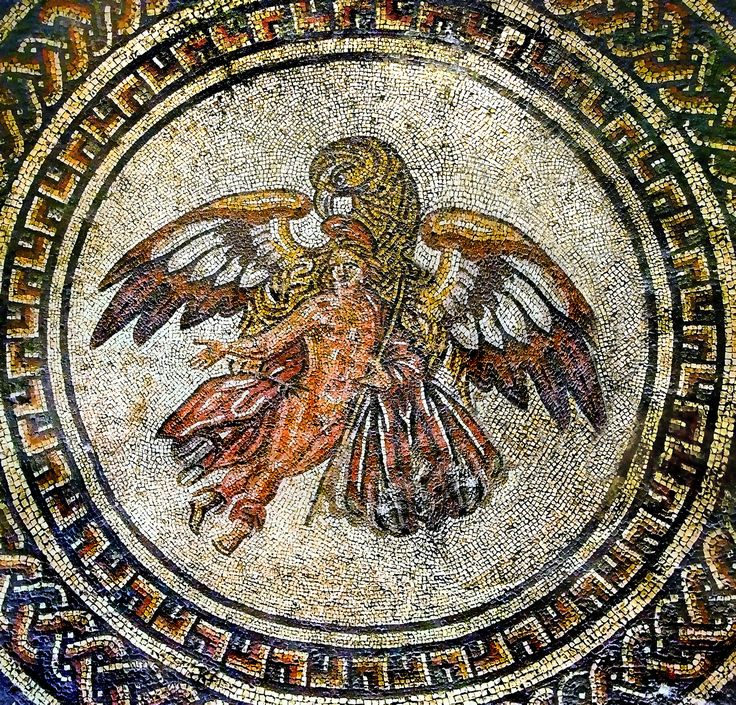
Often, as an example of pederastic sexual relations, the myth of Ganymede is cited, in which Zeus, who turned into an eagle, takes a beautiful young man to Olympus, where he makes him his favorite and cupbearer, granting immortality. Centuries later, a version appeared that Ganymede was also a concubine of Zeus, however Socrates, Xenophon and Plato reject such an interpretation. Xenophon, pointing to the etymology of the name (Ganu med - enjoy the mind), claims that Zeus loved the young man with immaculate love for his psyche - mind and soul.
Various artifacts with explicit sexual images belong mainly to Lupanarians (brothels), which does not at all indicate that the actions depicted on them were widespread in Greek culture. Usually, a person accessing the services of prostitutes pays for something that is not available to him under normal conditions. To make any generalizations based on such findings is equivalent to the fact that archaeologists of the future will unearth some BDSM club and, based on the objects found there, will draw a conclusion about the mores of all civilization.
On top of this, many of the images of “ancient homosexuality” circulating in cyberspace are either modern fakes and pastiches, or misinterpretations of heterosexual relationships.
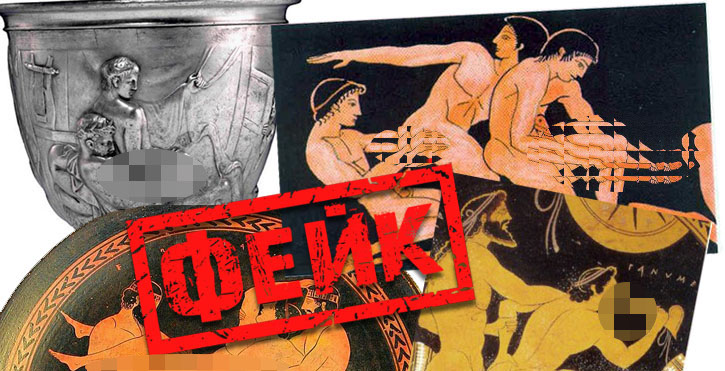
It is known that information about about 100000 ancient Greek vases containing images (Corpus Vasorum Antiquorum Project).
British researcher Kenneth Dover lists about 600 vases, drawings of which, in his opinion, "depict homosexual behavior or contain a hint of it." However, the analysis of each vase from the Dover list, carried out by the Greek expert Adonis Georgiades, revealed that homosexual subjects are directly observed on only 30 vases, and the remaining 570 vases depict heroes, battles, and even heterosexual subjects (Georgiades 2004, p. 100)
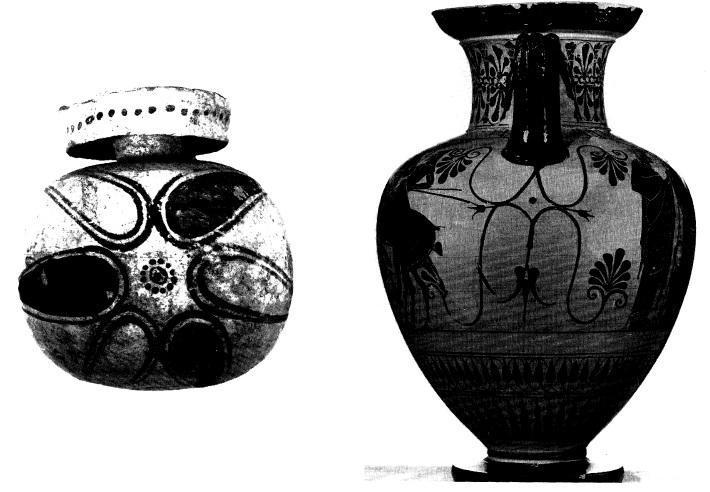
On the indicated 30 vases, you can find images of men reaching out with their hand to the boy's unexcited genitals (which the boy often stops), or trying to stick a penis between his hips in front. There is not a single image of anogenital same-sex contact, since passive participation in such an act was humiliating and offensive to a man. Only dissolute satires are depicted in direct orogenital homosexual contact with each other, along with sexual scenes with animals. Is it possible on the basis of this to conclude that bestiality (like sodomy) was acceptable in ancient Greece and, therefore, should become such in modern society?
Sappho from the island of Lesbos
LGBT activists use the image of a poetess named Sappho from the island of Lesbos as a symbol of female homosexuality, since, in their opinion, the short snippets of some of her poems that have survived to this day contain some kind of homoerotic hint. According to work literary historian - academician A.N. Veselovsky, Sappho's poetry is dedicated to the beauty of boys and girls, as well as love, abstracted from the rudeness of physiological sensuality. Hellenic Psychiatric Association recently published workaccording to which, the love between women in Sappho’s verses seems to be platonic and similar to Socrates’s relations with his students - that is, close personal relationships without a sexual context.
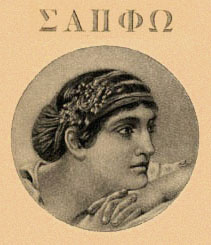
Given that Sappho threw herself off a cliff out of unrequited love for a man, and in classical Athenian comedy she was portrayed as a promiscuous woman who had numerous affairs with men, her symbolic status in modern “gay culture” is especially ironic. Assumptions about Sappho's homosexual preferences are just speculations of some authors that appeared centuries later after her death, and are, according to numerous Hellenists and historians, pure slander.
This is an undeniable historical fact that any society where sexual licentiousness spread was soon ceasing to exist. All who have taken sodomy
peoples have sunk into the abyss of centuries, and their contemporaries, imposed restrictions manifestations of sexuality, exist to this day. As history shows, when a society legalized vices and debauchery (which was invariably accompanied by general moral decay), it was soon overwhelmed by a wave of neighboring peoples, who were healthier and stronger. So ancient Greece rotted and fell apart, and imperial Rome fell under the pressure of barbarians. Antique Hellenes, with their famous straight nose without nose bridge, degenerated and were replaced by neighboring peoples from Asia Minor, which represent the majority of today's Greek population. Judging by what is happening in Western civilization, the same fate awaits her. We already see how Europeans who have accepted sodomy and other perversions are being replaced by Africans, Turks and Arabs.
A detailed study can be found on the 477 page in an informational and analytical report. “The rhetoric of the homosexual movement in the light of scientific facts”.
- doi:10.12731/978-5-907208-04-9, ISBN 978-5-907208-04-9
¹ Hellenic phrase "Ἐάν τις Ἀθηναῖος ἑταιρήσῃ, μὴ ἐξέστω αὐτῷ τῶν ἐννέα ἀρχόντων" translated by E.D. Frolova sounds like this: “If any Athenian becomes indulge, then it will not be allowed for him to be elected to the college of nine archons ... " It must be said that the translation was carried out in Soviet times, and for obvious reasons there could be no talk of homosexuality at that time. However, the literal translation would be: “If any Athenian is 'eterisi' (ἑταιρήσῃ) - will be a man's lover... »
² Same phrase "Ἄν τις Ἀθηναίων έλεύθερον παῖδα ὑβρίσῃ" Frolov translates as "If any of the Athenians inflicts violence over a free boy ... " The literal translation will be: "If some Athenians free youth" Ivrisi "(ὑβρίσῃ)" - literally "dishonor, corrupt, defile».

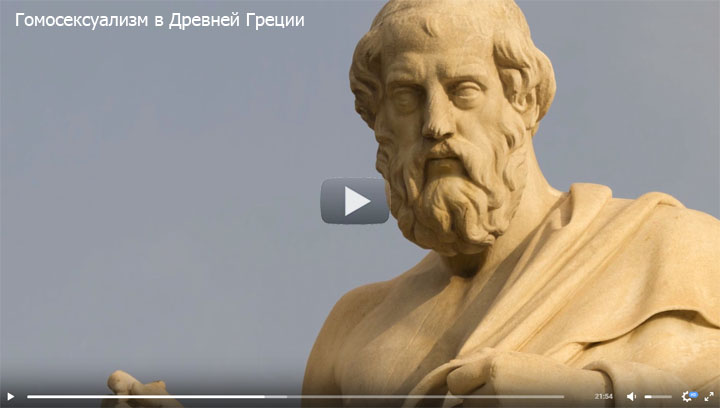
Still, the article lacks dates. Let’s say: “In Athens of the classical period, homosexuals were despised...”, what date does the author take for the classical period? And as a consequence, the question arises: what was the attitude then in the “non-classical” period? Essentially, the answer is in the first paragraph: “Throughout the entire history of mankind,” but then why write about a certain “classical” period?
In my opinion, it is important to emphasize that there was a negative attitude to pederasty before the advent of Christianity in the world. And there aren’t enough footnotes, for example, I’d be interested to know where the information about the Emperor Nero came from, for only about who is responsible for the 64 fire, conflicting information.
Thank you!
Thanks for the helpful comment. In the near future, all the shortcomings here will be eliminated. This can be said draft outline of chapter 11 from the report “The rhetoric of the homosexual movement in the light of scientific facts”which you can read from the 477 page. Nero is also spoken of from p. 433. Since the information about the arson of Rome is indeed ambiguous, we did not mention this in the report.
but Christians have never spent masculine gay men themselves used this lobby against feminine people, this is patriarchy
“Cursed before God is anyone who is hanged on a tree”
Deuteronomy 21:23 - Deut 21:23
い や い や 、 古代 ロ ー マ の 崩 壊 は 同 性愛 で は な く 、 邪教 キ リ ス ト 教 の 蔓延 で し ょ う w 現代 で も キ リ ス ト 教 国 ス 満 遍 し す い 腐敗 し な く 腐敗
Translated from Japanese: “No, the collapse of Ancient Rome is not homosexuality, but the spread of evil Christianity. Even in our time, the Christian nation is corrupted to the same extent. "
And no one claims that Rome fell because of homosexuality. Homosexuality was (if it was) only one of the symptoms of a sick society. Therefore, the morally decayed Romans were defeated by healthier nations, and Christianity only infiltrated the resulting vacuum. We are currently seeing a similar process in Europe that has abandoned Christianity, where healthier peoples are replacing decayed indigenous peoples.
I understand that this is a counter-propaganda site, but the fact that androphilic gays exist is never a fake, what is your argument about only biblical and Soviet? after all, the conversation was clearly then about masculine homosexuals and not “Boris Moiseevs with Sergei Zverev”
The author wrote in his article only well-reasoned facts, what other claims? The only thing he is mistaken about is that Rome fell because of the penetrated depravity in it, and also the person above who wrote about Christianity is also mistaken. Moral decay and Christian discord, as well as the rather light invasion of the barbarians (who used to be constantly given Lyuli) are the consequences, not the cause of the collapse of Rome. The main reasons were socio-economic.
this stupid propaganda of a certain site here is Pravoslavie.ru says that the masculine fagots were the quote “Offended by the fact that male homosexuality was constantly described as effeminacy” but in society there will still be hostility only towards effeminate people, even non-gays
HIV AIDS did not exist in ancient Greece
Man, you people are absolutely fucked in the head, clearly. I realize nothing I say will matter to such an ill informed, vile, hate filled writer.
Like first off, which is it—-the Greeks did NOT have a gay tolerant culture OR their culture fell because they were so gay tolerant?!?? Your facts are, in several instances, completely fabricated. You consistently use events or people or laws from the Roman Republic, Roman Empire all the way through Middle Ages as examples of your thesis that homosexuals didn't exist in Ancient Greece. Except Ancient Athens, precluded those other cultures by thousands of years.
So let's at least get that out of the way. You are historically inaccurate. The only “references” you mention are about 3 books from 1970s-90s that are non scientific opinions out of millions of published scientific/historical/archeological professional works done over millennia. Your ridiculous claims about works of ancient art being from brothers is absolutely false.
It's very clear that you don't like gay guys. Science has shown (in real country's) the most homophobic men, the angriest, the loudest are 80% of the time in the closet and the rest are mostly bisexual. You see, guys who are secure with their sexuality realize gay people aren't a threat to them. Clearly you aren't very secure.
cry about it pussy
Greece legalized LGBT marriages